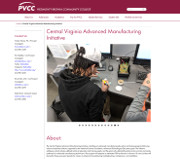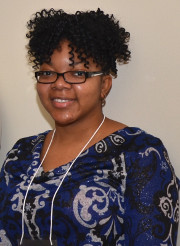
Central Virginia Advanced Manufacturing Initiative
www.pvcc.edu/technology
This project at Piedmont Virginia Community College is developing an advanced manufacturing education and training program to meet regional and statewide employment needs. Developing and maintaining a highly skilled workforce is a vital factor in sustaining a strong economy. This program responds to that need by training, educating, and certifying a technical workforce to international industry standards. The degree of collaboration among post-secondary faculty, technical educators, and industry is improved by this initiative and the pathway between secondary and post-secondary institutions is being strengthened. The student recruitment plan is carefully designed to attract and retain a diverse population. An organized effort is in place to disseminate the effective practices and outcomes resulting from this project to a broad audience.







